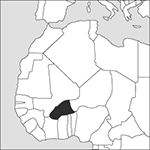
Source: MAPS IN MINUTES™ © RH Publications (1997)
Capital:
Ouagadougou
Area:
274,200 sq km (105,869 sq miles)
Population:
17,812,961 (2012 est)
Currency:
1 CFA franc = 100 centimes
Religions:
Muslim 60.5%; Roman Catholic 19.0%; traditional beliefs 15.3%
Ethnic Groups:
Mossi: over 40%; Mande, Fulani, Lobi, Bobo, Senufo, Grunshi, and other minorities
Languages:
French (official); Mossi; Dyula; Fulani; Lobi; local languages
International Organizations:
UN; AU; Non-Aligned Movement; Franc Zone; ECOWAS; WTO
A landlocked country in West Africa surrounded by Mali, Niger, Benin, Togo, Ghana, and Côte d’Ivoire.
Physical
Burkina Faso lies on a plateau, rising highest in the west and cut in the centre by the north–south route of the Volta River. The soils are mostly coarse and sandy, based on hard rock; the climate is hot and arid, and the natural vegetation except in the river valleys is thornscrub and thin savannah.
Economy
Burkina Faso is one of the poorest countries in the world, heavily dependent on western aid. The economy is mainly agricultural and vulnerable to drought, with most of the population engaged in subsistence agriculture. The major exports are gold and cotton. There is some industry, with largely unexploited mineral deposits of manganese and zinc. Many Burkinabé seek employment abroad.
History
Before French colonization in the 19th century the region was ruled by a number of Mossi states. It was a French protectorate from 1898, originally as part of French Sudan (now Mali) and later as Haute Volta (Upper Volta). It became an autonomous republic within the French Community in 1958 and independent in 1960. Following a military coup in 1970, a new constitution was adopted in 1977. A series of military governments followed, including those of Captain Thomas Sankara, who was assassinated in 1987, and Blaise Compaoré. The latter ended military rule in June 1991 and held multiparty elections. Compaoré’s Popular Front won these, and he became President. However, the opposition parties had withdrawn their candidates and there was a widespread boycott of the elections because of alleged corruption. Legislative elections, held in 1992, were won by Compaoré’s supporters. Compaoré and his party (now called the Congress for Democracy and Progress Party) have held power since then, with the opposition continuing to boycott elections until 2002. In 2011 popular and military unrest over rising prices and unpaid salaries challenged Campaore’s authority, but his regime survived. However, in 2014, there were street protests over his plan to extend the term of his presidency, and he resigned and fled the country. The army took power, but faced both national and international criticism. It quickly arranged the appointment of an interim civilian president, Michel Kafando. Elections were called for late 2015, which were delayed for over a month after an ultimately unsuccessful coup by disaffected soldiers in Sept 2015. The elections, almost universally regarded as free and fair, saw Roch Marc Christian Kaboré elected. He had been President of the National Assembly (2002–12), but left the ruling CDP in 2014, founding the People’s Movement for Progress party. Relatively immune from the impact of Islamic fundamentalism, there was shock when al-Qaeda in the Islamic Maghreb attacked a hotel in the capital, killing 30 people, in January 2016.
- tethered satellite system
- Tethyan realm
- Tethys
- Tethys Sea
- Tet Offensive (29 January–25 February 1968)
- tetra-
- tetrachloroethene
- tetrachloromethane
- tetrachoric correlation coefficient
- Tetracorallia
- tetracorals
- tetracosactide
- tetracyanoquinodimethane
- tetrad
- tetradecanoic acid
- tetraethyl lead
- tetragonal
- tetrahedral angle
- tetrahedral compound
- tetrahedral number
- tetrahedrite
- tetrahedron
- tetrahydrate
- tetrahydrocannabinol
- tetrahydrofuran